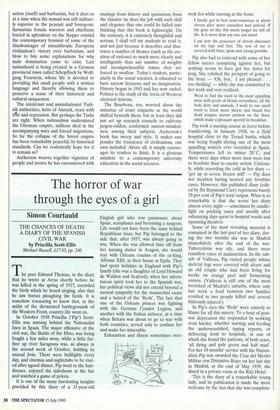History with many cunning passages
Dominic Lieven
THE BLACK SEA by Neal Ascherson Cape, £17.99, pp. 306 Iread this book looking out of my win- dow at - a Japanese summer storm. My neighbour's roof sagged under the weight of the rain. The sky was black. Under these circumstances even unleavened social sci- ence might have taken on the appearance of life. Ascherson's book roared and surged in sympathy with nature. Even without help from the weather this is a tremendous book. I have not read anything which is at the same time so interesting and so enjoy- able for a very long time.
At one level this is a traveller's compan- ion with descriptions of people and places in the Black Sea region. Since both the people and the places are colourful, various and fascinating, the book can hardly fail to catch the reader's sympathy. The descrip- tions come from a shrewd and practised journalistic pen with a sense of the bizarre and funny as well as of the beautiful. Near Rostov a Cossack community sets about recovering its pure Russian identity by hiring a restorer to re-paint the frescoes and icons of its village church, long desecrated under Soviet rule. Bombastic Cossack masculinity is baffled as the young female restorer re-creates all the saints as women.
Politics, nature, history, poetry and people are intertwined by Ascherson. For instance, the author visited the Crimea with western scholars in the middle of the August 1991 coup in Moscow. On one page we have ancient Greeks, mediaeval Venetians and their contemporary academ- ic followers. On the next a memory of troops sealing off Gorbachev's residence. Ascherson understands both classical and modern history. He uses both to illuminate issues which haunt contemporary mankind. Because he combines interests and approaches which are not usually found in one head he can make connections which most authors would miss.
The meeting of Scythian nomad and Greek city-dweller in the ancient world gives an early foretaste of Europe's age-old perception of the antithesis between civili- sation (itself) and barbarism, but it does so at a time when the nomad was still militari- ly superior to the peasant and bourgeois. Sarmatian female warriors and chieftains buried in splendour on the Steppe remind the contemporary feminist of some of the disadvantages of misanthropic European civilisation's victory over barbarism, and blow to bits some explanations for why male domination came to exist. Lazi nationhood is being created in a German provincial town called Schopfloch by Wolf- gang Feurstein, whose life is devoted to providing this small people with a written language and thereby allowing them to preserve a sense of their historical and cultural uniqueness.
The intolerant and assimilationist Turk- ish authorities, heirs of Ataturk, react with fear and repression. But perhaps the Turks are right. When nationalism undermined the Ottoman empire, millions died in the accompanying wars and forced migrations. So far the collapse of the Soviet empire has been remarkably peaceful, by historical standards. Can we realistically hope for it to remain so?
Ascherson weaves together vignettes of people and scenes he has encountered with musings from history and quotations from the classics: he does the job with such skill and elegance that one could be lulled into thinking that this book is lightweight. On the contrary, it is extremely thoughtful and serious. I shall tell my students to read it, and not just because it describes and illus- trates a number of themes (such as the cre- ation of nations) so much more clearly and intelligently than any number of weighty and incomprehensible tomes they are forced to swallow. Today's student, partic- ularly in the social sciences, is educated to have narrow horizons and no imagination. History began in 1945 and has now ended. Politics is the study of the trivia of Western electoral systems.
The Bourbons, too, worried about the minutiae of court etiquette as the world shifted beneath them, but at least they did not set up research councils to cultivate jargon-ridden, conformist narrow-minded- ness among their subjects. Ascherson's book has sweep and style. It makes one ponder the transience of civilisations, our own included. Above all, it simply encour- ages its readers to think. It is a glorious antidote to a contemporary university education in the social sciences.



















































 Previous page
Previous page